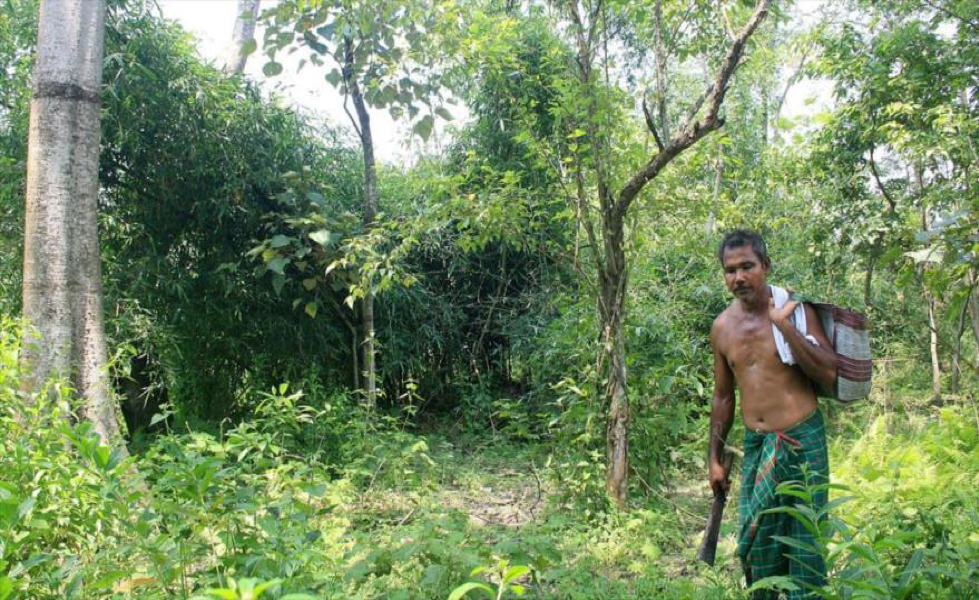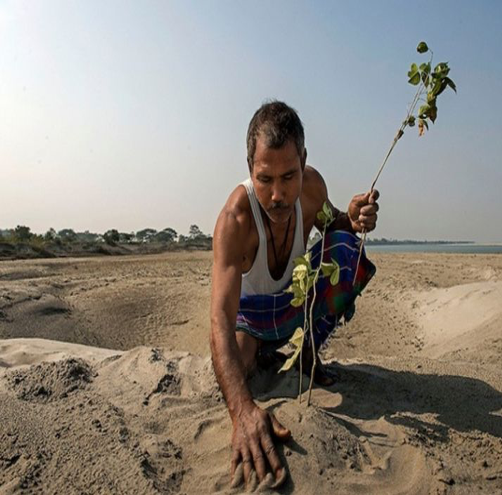He started with 20 bamboo trees. For three decades and more, he followed the daily routine of planting trees, nourishing them, watching them slowly grow — like a mother watches her little children grow. In these 39 years, he has created a forest of 1400 acres. With it he has created a green and lush […]

He started with 20 bamboo trees. For three decades and more, he followed the daily routine of planting trees, nourishing them, watching them slowly grow — like a mother watches her little children grow. In these 39 years, he has created a forest of 1400 acres. With it he has created a green and lush natural ecological habitat for wildlife and flora and fauna. There are trees laden with fruits, and different varieties of medicinal plants.
In Jadav’s forest, there are leopards, deer, wild pigs, elephants, monkeys, rabbits, snakes and vultures. Wide varieties of vegetables and trees grow here including Arjun, Pumpkin, Jackfruit, Gulmohar, Pineapple, Bamboo, Saal, Sagwan, Blackberry and Mango.
Jadav Payeng in conversation with Rais Ahmad ‘Lali’.

So how did this journey start?
I was born in this place. This place was famous for its wildlife, trees plants and bio-diversity. Those days ships would come from Kolkata; there was a railway station also. Now, both the dock and the railway station have disappeared. Like other families, my family too settled down in Majuli. I went to Baligaon for my studies. I have passed class 10. Those days the Mishing community used to rear cows, buffalos and pigs – many of them do the same thing even now. After a certain phase, I went with the cattle to my village in Majuli Island where I was born. It had turned into a kind of desert by the furious floods of the Brahmaputra. In 1979, there was another flood. After the flood in June and July, when the water receded and everything dried up, then, due to the unbearable heat of the sand, several snakes were found dead. After I saw the animals suffering and dying, it really broke my heart. It was deeply disturbing. I became restless. I thought that if due to this heat snakes can die, then, surely, one day, human beings too will die. I decided that I must do something. I went and met the elders of the Devri community, 5 kilometres away. I asked them for suggestions — what should be done? They said that you grow the tallest ‘Ushn’ grass. I had just passed class tenth. My child-like mind just could not understand this solution. Then they gave me 50 bamboo seeds and 20 bamboo shrubs to plant in the desert-island. I sowed the seeds and shrubs in the same spot where the snakes were buried and watered them every day. I used an earthen pot in which I made a small hole. Slowly, the bamboo trees started growing taller. I planted other seeds under their shade. This became integral for each day of my life for the next four decades. In no time, the plants became trees and the trees became a dense jungle.
What is the situation now? What is the state of the 1400 acre of forest that you have made? What kind of life sustains in the forest?
The moment the trees started growing and spreading, the villages became alive. Deserted villages found life yet again. The eco-system became balanced and stable with the growth of the forest. Today there are leopards, rhinoceros, elephants, wolves, deer and vultures out there.
Did you ever feel that you will not succeed? Did you ever feel demoralised?
I started this journey as a duty. I never thought about the consequence, I just did my job. I became intrinsically attracted to this work. Perhaps that is why I did not face any obstacle. I knew what I was doing. Trees give oxygen, which is crucial for all living creatures on earth. If there are no trees, neither human beings nor any other life-form or wildlife can survive on earth. As the jungle took shape all kinds of animals started coming to the forest. When elephants arrived in 2008 for the first time, the locals wanted to destroy the forest because they felt threatened by the elephants. I told them, if you want to cut the forests, you have to cut me into pieces first. I tried to make them understand, that, like us, elephants too need to feed their stomachs. Our own greed and hunger has rendered them homeless, after all. We have made the mistake that we have not bothered to think about their problems; that is why they have now started moving towards our homes. They are after all wild animals. As human beings, we should understand their pain and dilemma. If elephants damage our crops and homes, then we should demand compensation from the government. The villagers understood my argument. There is a paradigm shift in their way of thinking now. They chase away the elephants, but they don’t talk of destroying the forests. Despite this, I would say that there is poverty in our villages. A family earns merely Rs 3000 per month. In this scenario, when elephants damage their homes, or eat away their crops, they find themselves in great difficulty.
Will you like to comment on those who encouraged you, and those who tried to break your morale?
In the beginning I was alone, sowing seeds and plants. That is why my marriage got delayed – after I had turned 40. Later, my wife too helped me occasionally. The government also initiated forestation programmes. Some villagers too came forward. The fact is that every person in my village is waging a daily struggle for survival and livelihood. That is why they just can’t find time to do other things. In this situation, you can’t compel them to do other things.
You made a forest to stop the destruction unleashed year after year by Brahmaputra. Has this problem been solved?
I did not plant trees to stop floods. However, it is true that the roots of trees hold the soil, and stop the flow of soil. I don’t know if my forest has stopped floods, or stopped earth getting drowned or swept away, but several kinds of wildlife, birds and living creatures have found a natural refuge. Even today our island is not outside danger. We hope that the government and officials who are in-charge of Brahmaputra river will create forests here and thereby save the land.
Did your work have any impact in other parts of the country?
I want to make the whole world aware about environment. However, the beginning should start from your own home. We are working towards this goal and hope to succeed in the days to come. We want to organise forest festivals during monsoon all over the country. These festivals would include a collective celebration for three hours, planting of trees and plants, sports and cultural programmes. I believe that growing plants and trees provides tremendous mental exhilaration. We want to do this in a big scale and make the love of nature as part of daily life and social culture. We have called it ‘Forestation Bihu’ in Assam. People have planted 5000 plants in different kind of places and we are going to take care of them. We go to schools and colleges and inspire students to plant trees and nourish and protect them. We are proposing that in all schools of India; during admission every student should sow one seed or plant, and the school authorities or officials should take the responsibility of helping the plant grow into a tree. By the time a student reaches class five, and the plant has grown into a tree, then it can be safely stated that the student now deserves his fundamental right to oxygen. This is because we take ‘free oxygen’ for granted. After this, every student should sow another plant when they reach class six.
How do you manage your daily life economically?
I belong to the Mishing community. We look after our cattle. I catch fish also. I have pigs, cows and buffalos. I sell cow milk, so our needs are taken care of. We buy only oil, matchbox and salt from the market. Rest we get from nature. What we take from nature, we try to return something to it also.
Did your mission get any support from the government?
What the country has given me, or what it can give — that has never been my concern. I have always believed that the main question is what I have given to my country. If the government wants to make the entire country green, and if they need our help, then, I and my team will be happy to take up the task. Every state government should organise a forest festival. We will be too happy to join in the effort.
You are talking of ecological balance. In recent times, some forces are running a campaign against non-vegetarian people. How do you look at this vegetarian versus non-vegetarian controversy whereby those who eat beef are being attacked?
The Mishing community is non-vegetarian, but we have never killed a four-legged animal. We eat fish and chicken. My belief is that individuals should be judged on the basis of their values and character. In our area, the cow is worshipped. Cows help us in getting our livelihood. We use buffalos for agriculture. That is why we love and respect both cows and buffalos. Since we are nature lovers, there is often hostility towards non-vegetarians. However, we should not hate those who eat meat.
What is the ‘Forest Man of India’ interested in apart from forest and wildlife?
Education: it makes human beings cultured. In any case, India has been a centre of knowledge and education. The first and last goal of education is to build character. These days education has become a commercial commodity. Education should not only lead to making money. This is not the correct path if we want to make a better society, a better world. We should pay serious attention to this issue.
You are from a tribal community. What are the main problems affecting tribals in India?
I think education is the most important necessity for tribal communities in India. Education should be brought to their doors, in their own language.
Do you wish to say anything but have not been able to, due to lack of a medium?
I will like to make an appeal to journalists that they should create more awareness about environment, and how to protect and nourish it. We want forest festivals all across India and in the world, and journalists should write about it.
2010 — Wildlife photographer Jitu Kalita made a documentary on Jadav Payeng: ‘The Molai Forest’. This film was screened across universities in India. In her film ‘Foresting Life’, Arti Srivastava highlighted several unknown facts of his life, including the difficulties he faced.
2012 — Honoured by Jawaharlal Nehru University (JNU), New Delhi.
2013 – Awarded by the Indian Institute of Forest Management, Bhopal.
2015 – Jadav Payeng was awarded the Padmashri.


